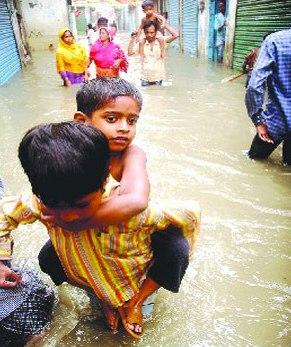When it rains, it pours.
Recent floods in Pakistan have caused massive amounts of damage, and over 350 people have died. Five million people have been directly affected, 1.7 million acres of farmland have been inundated with floodwater, and 1.2 million homes have been washed away, according to the country’s National Disaster Management Authority.
Upwards of four million people have become homeless as a result of the recent rains, reports Pakistan’s local TV channel Express.
Pakistan’s Prime Minister Syed Yousaf Raza Gillani was quoted as saying that the recent rains in the country’s southern Sindh province were 142 percent above normal in the area. He said that 4,000 medical camps have been set up, which can accommodate 150,000 of the four million displaced people.
“While the government had mobilized all national resources, the severity and magnitude of the floods had created a humanitarian emergency requiring support from the international community,” Pakistan’s Foreign Office said in a statement.
Despite the enormity of the flooding, international assistance is only trickling in.
“The level of international aid is pitiful, even measured against the limited assistance donated in other recent disasters,” said Irfan Mufti, a reporter in Islamabad.
However several countries have responded to Gillani’s appeal for aid.
The U.S., China, Iran, and even Japan — still reeling from its own natural disaster — have pledged support. So have the U.N., the European Union, and several non-government agencies.
“There are several reasons why the international community might have acted slower than it should have,” Assistant Professor of Peace and Conflict Studies Amal Khoury said in an email interview.
“The challenge to reach those people in the affected areas” plays a role, said Khoury, adding that additional factors include “the existence of a fatigue syndrome after they have assisted the victims in the 2005 earthquake and the 2010 floods, and lack of trust in the Pakistani government.”
Currently, the military is working alongside the government to organize relief efforts, with few external agencies providing any assistance.
“The cold response comes not from donor fatigue,” say observers, “but from questions being raised over the government’s ability to raise a portion of the funds,” The Express Tribune reported.
In addition, aid agency Oxfam accused Pakistan’s government of failing to invest in prevention measures after severe floods affected over 20 million people last year.
All of these factors have contributed to the limited aid that Pakistan has received. Monsoon rains continue, destroyed railway and road networks impede relief efforts, and a lack of funds has left many without assistance.
But in addition to the destruction, Pakistanis now have to worry about dengue fever, a water-borne illness spread by mosquitoes.
“Property damage is catastrophic,” said Angie Moore, associate professor of geology. “But many times, particularly with countries without established sanitation systems, the most harmful things to come out of a flood of this magnitude can be a lack of safe drinking water and a surge of water-borne diseases.”
Mosquitoes proliferate in standing water and Pakistan has seen an outbreak of fatal dengue disease in the wake of the flood. More than 5,000 people have been infected, and the disease has claimed at least 36 lives, according to Islamabad’s provincial health department.
The unprecedented rain spells that have caused the flooding and dengue outbreak are caused by climatic changes and will only continue, according to Prime Minister Gillani.
Moore agrees.
“Data sets show that natural disasters are occurring with higher frequency and intensity,” she said.
While Pakistan works to rebuild its infrastructure and clean up after the floods, the country also must prepare for food scarcity and a major setback of its economy. Flooding has destroyed farmland, orchards, cattle, and major cash crops.
As a result, even if the country manages to raise enough capital for immediate rescue and response, it faces a looming economic crisis once the floods recede.

